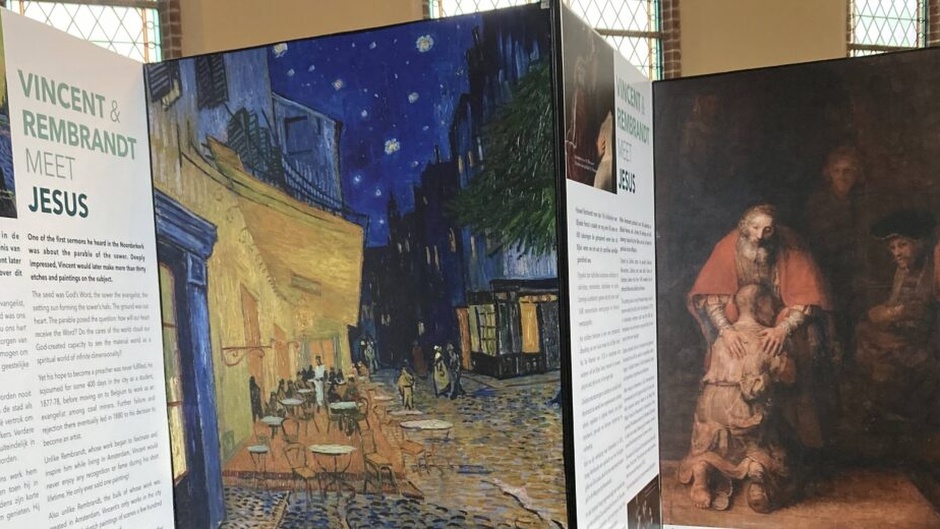The greatest artist?
Despite the popular impression that Van Gogh discarded his faith in Christ when he became an artist, his letters reveal that Jesus remained his chief inspiration.
26 MARCH 2024 · 10:36 CET

Who was the greatest artist who ever lived?
A quick search online offers several lists of ‘greatest’ artists, frequently naming the following : Leonardo, Michaelangelo, Rembrandt, Vermeer, Van Gogh, Monet, Picasso, Dali,…
Notably Dutch painters rank consistently among the world’s greatest.
Even Philip II, the 16th century king of Spain against whom the Dutch rebelled, was the greatest fan of Jeroen Bosch, the Dutchman whose surrealist works of fantasy depict sin and human moral failing.
The king was the greatest collector of Bosch’s paintings, many still to be seen in the Prado Museum in Madrid.
Currently the Rijksmuseum in Amsterdam features Frans Hals’ works, ‘one of the most famous and most extraordinary Dutch painters of the 17th century’.
Notably Dutch painters rank consistently among the world’s greatest
The Dutch Golden Century also produced Johannes Vermeer, one of the century’s most talented painters, capturing everyday middle-class Dutch life in masterful light and colour.
Most however recognise Rembrandt van Rijn as the greatest of all Dutch painters. Some would say of all painters.
According to the renowned art scholar Kenneth Clark, Rembrandt’s The return of the prodigal was ‘the greatest ever painted’.
The Nightwatch, his biggest and most famous painting, enjoys pride of place in the Rijkmuseum. Rembrandt produced nearly 300 paintings, most while living in Amsterdam. Yet only 22 can be seen in the Rijksmuseum.
Just across the Museumplein from the Rijksmuseum is the world’s largest collection of the works of the artist Britannica Encyclopaedia ranks the greatest – after Rembrandt.
The Van Gogh Museum is home to a whopping 200 paintings, 400 drawings and 700 letters from Vincent’s hand.
Ironic
Which is rather ironic. For Vincent only painted two works in the city where he once lived for just over a year – not as an artist but preparing to study theology.
The 24-year old had no plans to become an artist when he came to Amsterdam studying to become a preacher like his dad.
And those two paintings were sketched on a brief visit to Amsterdam at a later date. He was living in Brabant at the time working on the Potato Eaters.
While waiting for a friend to arrive on the train, he pulled out his palette and made the sketches on the spot before going off together to study Rembrandt’s paintings in the newly opened Rijksmuseum.
If a few years later we could have asked Vincent who the greatest artist was, he would not have hesitated to answer.
The young artist was greatly inspired by Rembrandt whose brush work, themes and colours he studied closely.
Van Gogh had no plans to become an artist when he came to Amsterdam studying to become a preacher like his dad
“Rembrandt goes so deep into the mysterious that he says things for which there are no words in any language,” he wrote to his brother Theo. “It is with justice that they call Rembrandt — magician— that’s no easy occupation.”Yet for Vincent there was an artist even greater than the great magician.
In one of his 700 letters, he wrote to his friend Emile Bernard of “an artist greater than all artists — disdaining marble and clay and paint — working in living flesh’. ‘This extraordinary artist… made neither statues nor paintings nor even books… he made.. living men, immortals.’
Despite the popular impression that Vincent discarded his faith in Christ when he decided to become an artist, his letters reveal that Jesus remained his chief inspiration through to the end.
That same letter began: “You do very well to read the Bible. …The Bible — that’s Christ, because the Old Testament leads towards that summit; St Paul and the evangelists occupy the other slope of the holy mountain….
Sublime
He often wrote about his two favourite books: one, ‘Pilgrim’s Progress’ by John Bunyan, the story of Christian’s determination to struggle on the narrow way through life’s hardships and temptations to reach the Celestial City; and the other, ‘The imitation of Christ’, by Thomas a Kempis, which he once described as ‘sublime’.
Yet unlike Rembrandt, Vincent rarely painted Jesus. His symbolism depicted the divine presence in everything golden: sunflowers, wheatfields, the sun and the stars…
Rembrandt on the other hand painted the Christ figure many times, often revealing deep theological understanding despite his own moral shortcomings.
How two of the world’s greatest artists were inspired by the ‘artist greater than all artists’ is the theme of an exhibition
He painted and etched Christ’s infancy, his parables, his ministry, his passion, his crucifixion, and his resurrection.Throughout his career, two faces fascinated him: his own, which he painted more than 90 times, and that of Jesus.
I have been asked to hold this weekend in a village church on the River Waal, south of Utrecht, with the title: Rembrandt and Vincent meet Jesus.
The exhibition began as part of the 400-year commemoration of the Noorderkerk in Amsterdam’s Jordaan district last year, where a light-and-sound show, Vincent meets Rembrandt, projected by 36 projectors on the walls and ceiling, highlighted how the younger artist was inspired by the older.
That stirred my awareness that both these masters acknowledged being inspired by an even greater artist.
Jeff Fountain, Director of the Schuman Centre for European Studies. This article was first published on the author's blog, Weekly Word.
Published in: Evangelical Focus - Window on Europe - The greatest artist?
